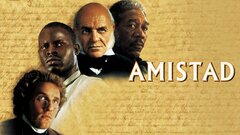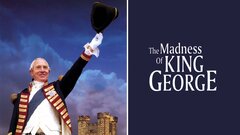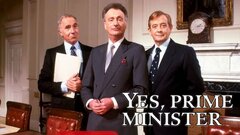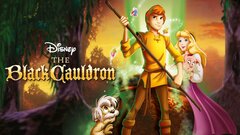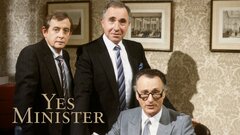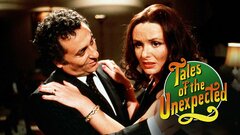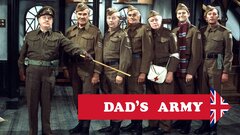The ultimate late-bloomer, British character player Nigel Hawthorne had nearly 45 years as an actor under his belt when he finally broke through to stardom with his compelling performance in the title role of "The Madness of King George" (1994). On stage, the role earned him an Olivier Award (among other honors), while the film version garnered both a BAFTA Award and a Best Actor Oscar nomination. But were it not for the insistence of playwright Alan Bennett and first-time feature director Nicholas Hytner (who had directed the play "The Madness of George III"), the role probably would have gone to someone with a more prominent Hollywood profile.
Hawthorne's ability to be endearing in the part of a pompous, autocratic old bastard moved Bennett to write in the play's preface that "without Nigel's transcendent performance, the King could have just been a gabbling bore and his fate a matter of indifference." Hytner has said of the film: "We wouldn't have been able to do the movie in eight weeks if Nigel hadn't played it."
Having made his London stage debut in a 1951 production of "You Can't Take It with You," Hawthorne knocked about theaters in South Africa and Britain for two decades without much fanfare. When he reached his 40s, however, his face began to show character, revealing new vulnerabilities, and better parts came his way. After acting in his first feature, Richard Attenborough's "Young Winston" (1972), he made his Broadway debut as Touchstone in "As You Like It" (1974), and success in that role coupled with his turn in Simon Gray's "Otherwise Engaged" (1975) led to his much-praised portrayal of Major Giles Flack in the Royal Shakespeare Company's production of "Privates on Parade" (1977).
Hawthorne started to get work in British TV projects like "Madame Curie" (BBC-2, 1977, playing Pierre Curie) and the miniseries "Edward and Mrs. Simpson" (Thames TV, 1978), as well as more international fare (like the 1978 NBC miniseries "Holocaust"), but all were a prelude to his breakthrough screen role as the stiff-lipped, quick-witted civil servant Sir Humphrey Appleby in the acclaimed political satire "Yes, Minister" (BBC-2, 1980-83), for which he gained notice on both sides of the Atlantic. Usually cast as an older dignitary or a man of official status, Hawthorne began turning up more frequently in features, reuniting with Attenborough for "Gandhi" (1982), despite the humbling fact that the director had no recollection of him, and working with actor-director Clint Eastwood on the languid "Firefox" (both 1982), recalling him as "a most delightful man to work with" but having to fight "to get another take out of [him]."
TV remained a staple as he appeared in fare like "The Hunchback of Notre Dame" (CBS, 1982, as a Magistrate), "Pope John Paul II" (CBS, 1984, playing a Cardinal), and "Jenny's War" (syndicated, 1985, as a Colonel) before reprising Sir Humphrey Appleby, now a Cabinet Minister, in the sequel series "Yes, Prime Minister" (BBC, 1986-88).
Yet, when his screen career inevitably stalled, it would be stage roles that ultimately took him to the next level. After winning a 1991 Tony Award as author C S Lewis in "Shadowlands" and seeing the film go to Anthony Hopkins, he courted a higher profile in Tinseltown by playing the villain in "Demolition Man" (1993), hoping the added exposure would keep him from losing out in "The Madness of King George" sweepstakes. His experience, however, was far from pleasant: "[Sylvester Stallone and Wesley Snipes] barely acknowledged my presence. It was a very cold greeting, most odd, as if I didn't exist."
Hawthorne's sympathetic, humorous and ultimately compassionate portrayal of the British monarch losing his faculties (temporarily), as well as his American colonies, ultimately brought a flood of offers. There were the feature film adaptations of the Bard ("Richard III" 1995, "Twelfth Night" 1996) and two television projects of unusual quality, Arthur Penn's Showtime political drama "Inside," for which his brutal, career-driven Colonel Kruger served as a living embodiment of the excesses of apartheid, and "The Fragile Heart" (both 1996), which earned him a sixth BAFTA Award.
Hawthorne then turned in a fine performance as President Martin Van Buren in Steven Spielberg's historical opus "Amistad" (1997) and reteamed with Hytner to play a gay theater critic in "The Object of My Affection" (1998). After decades of anonymity, he had the luxury of being choosy, turning down the Geoffrey Rush role in "Shakespeare in Love" (1998, "I found the movie very flippant and insignificant"), but suffering no shortage of work. Because of his admiration for David Mamet, who directed and adapted the "old warhorse," Hawthorne accepted the role of the patriarch who nearly drives his family to ruin in order to see his son's name cleared in the remake of "The Winslow Boy" (1999 and crafted yet another crusty figure of authority.
Later that year, he lent his plummy vocals to the role of Professor Porter in Disney's animated "Tarzan" before undertaking an unexpected return to the theater in Yukio Ninagawa's staging of "King Lear."



















